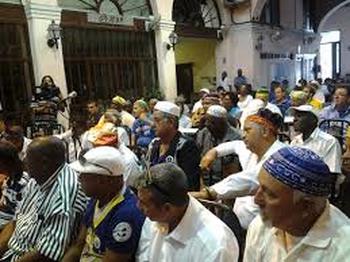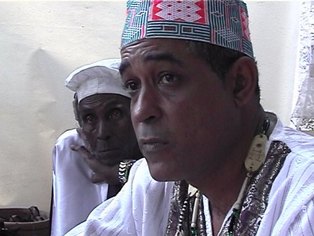The person who tries to be both the head and the tail will never rest. (El que hace de cabeza de cola nunca descansa).

One of the proverbs that accompanies Oyekun Nilogbe (the letter of the year 2017 drawn by the babalawos at the Sociedad el Cristo in Palmira, Cuba) says: The person who tries to be both the head and the tail will never rest. (El que hace de cabeza de cola nunca descansa). In order to understand this idea in context, we can refer to another proverb that also comes with Oyekun Nilogbe that tells us: Those who were born to be the head can't remain in the tail (el que nació para cabeza no se queda en la cola). The idea inherent in these two proverbs is that we all have a role and a function that corresponds to our nature as individuals. Those who were born to be the "head" can't remain in the "tail," meaning those who have leadership skills and abilities aren't going to be happy with anything else. They won't be good at anything else. They don't like to follow orders from anyone, and if they find themselves in subservient positions for very long, they rebel, act out, and gain a reputation for being arrogant and pushy. Of course, the ascent to leadership status takes time and hard work, but those who are meant to be the "head" need opportunities to show what they're capable of doing. Leadership isn't automatic, but if people with good leadership skills never have the authority to put ideas into practice, they become frustrated and resentful. If they're assigned to do the work of the "tail" instead of the "head," the whole organism starts to suffer. They aren't effective at the job because it doesn't suit their nature.
In our society today, where competition and individual enterprise are valued so highly, many people like to think that they were born to be "heads" and not "tails." But society can't be made up only of heads. The tail has a function, too. Think about animals with tails. Some animals use the tail to maintain balance. Others use it to brush away flies and other biting insects. Some have prehensile tails that allow them to hang from tree branches or to grasp things. The scorpion uses its tail for self-defense and as a weapon to attack. The peacock's colorful tail gives it a unique identity and is useful for attracting a mate. Fish use their tails to navigate through water. When a fox curls into a ball, its fluffy tail becomes a warm cover for the face. An alligator uses its tail to store fat. And, many animals like dogs and cats, use their tails to communicate emotions. The neurotransmitters that send messages from the brain to the tail and other body parts allow the animal to function optimally so each part of the body works in unison. The head needs the rest of the body, including the tail, to make the animal whole.
In our society today, where competition and individual enterprise are valued so highly, many people like to think that they were born to be "heads" and not "tails." But society can't be made up only of heads. The tail has a function, too. Think about animals with tails. Some animals use the tail to maintain balance. Others use it to brush away flies and other biting insects. Some have prehensile tails that allow them to hang from tree branches or to grasp things. The scorpion uses its tail for self-defense and as a weapon to attack. The peacock's colorful tail gives it a unique identity and is useful for attracting a mate. Fish use their tails to navigate through water. When a fox curls into a ball, its fluffy tail becomes a warm cover for the face. An alligator uses its tail to store fat. And, many animals like dogs and cats, use their tails to communicate emotions. The neurotransmitters that send messages from the brain to the tail and other body parts allow the animal to function optimally so each part of the body works in unison. The head needs the rest of the body, including the tail, to make the animal whole.
The Importance of Understanding Your Role

This metaphor of head and tail can describe relationships between groups of people, too. We can talk about the head of an organization, or the head of a family. Whenever people are organized in groups, someone emerges as the "head," whether it's through election, appointment, or a natural, organic process. Problems arise when the wrong person accepts the role of head, because if the head isn't working well, the entire group suffers. That's why it's so important for individuals to know themselves, know their abilities and skills, know what motivates and drives them, and understand what leadership really means. Being a good leader isn't so much about telling other people what to do as it is recognizing what others are good at and encouraging them to do that job to the best of their ability. In other words, in order for a group to work well together, the "head" and the "tail" need to value each other's contributions, recognize that they play different roles, but keep open communication so there are no misunderstandings about who needs to do what.
Some heads mistakenly think they have to do everything themselves because no one else can do things as well as they can. They may have the talent, the ambition, the energy and drive to do everything well, but a human being can only do so much without breaking down or wearing out. Overwork and exhaustion can lead to physical problems as well as emotional ones. The proverb reminds us that we can't do everything on our own. Some tasks are too big for one person, but perhaps even more importantly, as human beings, we're social beings and we need to know how to behave in a group. No one lives in total isolation. Sooner or later, in one setting or another, we have to interact with other people, and we need to understand and appreciate the ways we can work together. People who do the work of the head and the work of the tail, and all the work in between, will never rest. In addition, those people will probably be ineffective in some of the jobs they're doing because their attention is scattered, they lack focus, and they're overextended. The lack of balance in these people's lives deprives them of other experiences that could bring satisfaction and pleasure. They're never finished with work, because there's always more work to do.
Some heads mistakenly think they have to do everything themselves because no one else can do things as well as they can. They may have the talent, the ambition, the energy and drive to do everything well, but a human being can only do so much without breaking down or wearing out. Overwork and exhaustion can lead to physical problems as well as emotional ones. The proverb reminds us that we can't do everything on our own. Some tasks are too big for one person, but perhaps even more importantly, as human beings, we're social beings and we need to know how to behave in a group. No one lives in total isolation. Sooner or later, in one setting or another, we have to interact with other people, and we need to understand and appreciate the ways we can work together. People who do the work of the head and the work of the tail, and all the work in between, will never rest. In addition, those people will probably be ineffective in some of the jobs they're doing because their attention is scattered, they lack focus, and they're overextended. The lack of balance in these people's lives deprives them of other experiences that could bring satisfaction and pleasure. They're never finished with work, because there's always more work to do.
Prevent or Diminish the Problem Before it Happens

Oyekun (the first part of this compound Odu) speaks about conflict between brothers. Here, brothers can be extended to mean people we work with, or associate with, as well as family members. Nilogbe (the second part of the Odu) reminds us that others don't appreciate it when we jump in to do their work for them. We might think we're helping, but they see us as arrogant or overly assertive. They see our "help" as implied criticism of their inability to do the job well. For this reason, a person who occupies the position as "head" of a group or organization needs to back off at times and let others do their jobs, even if it's not exactly the way the "head" imagines it should be done. We need to develop patience and let go of some of the control so others can have a chance to contribute something to the group effort.
Because the Letter of the Year comes with osborbo Ofo Lowe Arayé (loss due to conflicts and arguments), we can apply the proverbs in an effort to avoid or diminish the potential problems associated with arayé. Arayé comes from bickering, arguing, petty criticism, talking behind people's backs. It's the daily tension felt in groups that are dysfunctional or where individuals have problems setting clear boundaries for themselves within the group. Whether it's a loss of relationships, a loss of business, a loss of money, or a loss of home, if a loss comes for you in 2017, it will come as a result of conflicts caused by arayé. Nothing is written in stone, so you aren't necessarily going to experience loss if you take steps now to prevent it. Decide whether or not you're really meant to be the head, and if you are, how can you improve your leadership style? If you're meant to be in the tail, take pride in that role and don't feel you're a lesser person because of it. Know where you belong, and find the role that fits your nature, that allows you to be happy and productive without changing your fundamental character. Recognize the need for good communication and mutual respect, and don't try to do everything yourself. Set healthy boundaries, and stick to them.
Because the Letter of the Year comes with osborbo Ofo Lowe Arayé (loss due to conflicts and arguments), we can apply the proverbs in an effort to avoid or diminish the potential problems associated with arayé. Arayé comes from bickering, arguing, petty criticism, talking behind people's backs. It's the daily tension felt in groups that are dysfunctional or where individuals have problems setting clear boundaries for themselves within the group. Whether it's a loss of relationships, a loss of business, a loss of money, or a loss of home, if a loss comes for you in 2017, it will come as a result of conflicts caused by arayé. Nothing is written in stone, so you aren't necessarily going to experience loss if you take steps now to prevent it. Decide whether or not you're really meant to be the head, and if you are, how can you improve your leadership style? If you're meant to be in the tail, take pride in that role and don't feel you're a lesser person because of it. Know where you belong, and find the role that fits your nature, that allows you to be happy and productive without changing your fundamental character. Recognize the need for good communication and mutual respect, and don't try to do everything yourself. Set healthy boundaries, and stick to them.



 RSS Feed
RSS Feed
